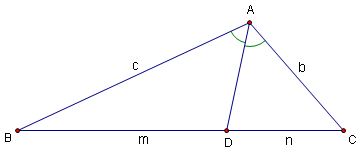Difference between revisions of "Angle bisector"
m |
|||
| (5 intermediate revisions by 2 users not shown) | |||
| Line 1: | Line 1: | ||
{{WotWAnnounce|week=June 6-12}} | {{WotWAnnounce|week=June 6-12}} | ||
| − | For an [[angle]] <math>\angle | + | For an [[angle]] <math>\angle BAC</math>, the (internal) angle bisector of <math>\angle BAC</math> is the line from <math>A</math> such that the angle between this line and <math>\overline{AB}</math> is congruent to the angle between this line and <math>\overline{AC}</math>: |
<center>[[Image:Anglebisector.png]]</center> | <center>[[Image:Anglebisector.png]]</center> | ||
| − | + | An [[angle]] <math>\angle BAC</math> also has an external angle bisector, which bisects external angle <math>BAC</math>: | |
<asy> | <asy> | ||
| − | pair A,B,C,D; | + | import markers; |
| + | pair A,B,C,D,E,F; | ||
B=(0,0); | B=(0,0); | ||
C=(5,0); | C=(5,0); | ||
A=(4,2); | A=(4,2); | ||
D=(3,4); | D=(3,4); | ||
| + | E=(10/3,0); | ||
| + | F=rotate(-90,A)*(E); | ||
draw(A--B--C--cycle,blue); | draw(A--B--C--cycle,blue); | ||
draw(C--D,blue); | draw(C--D,blue); | ||
| + | pen p=blue+0.15mm; | ||
| + | draw(A--F,p); | ||
dot(A^^B^^C,red); | dot(A^^B^^C,red); | ||
label("$A$",A,NE); | label("$A$",A,NE); | ||
label("$B$",B,W); | label("$B$",B,W); | ||
label("$C$",C,E); | label("$C$",C,E); | ||
| + | markangle(n=1,radius=20,D,A,F,green); | ||
| + | markangle(n=1,radius=22,F,A,B,green); | ||
</asy> | </asy> | ||
| − | The | + | The external angle is defined by <math>\angle A + \text{ external }\angle A = 180^\circ</math>, and the two angle bisectors are perpendicular to each other. |
== Features of Angle Bisectors == | == Features of Angle Bisectors == | ||
| Line 33: | Line 40: | ||
{{asy image|<asy> | {{asy image|<asy> | ||
| − | + | size(300); | |
| + | import markers; | ||
pair excenter(pair A, pair B, pair C){ | pair excenter(pair A, pair B, pair C){ | ||
pair X, Z; | pair X, Z; | ||
| Line 40: | Line 48: | ||
return extension(X,A,Z,C); | return extension(X,A,Z,C); | ||
} | } | ||
| − | pair X=(0,0), Y=(10,0), Z=(3,6); | + | pair X=(0,0), Y=(-10,0), Z=(-3,6); |
pair exX=excenter(Z,X,Y), exY=excenter(X,Y,Z), exZ=excenter(Y,Z,X); | pair exX=excenter(Z,X,Y), exY=excenter(X,Y,Z), exZ=excenter(Y,Z,X); | ||
| − | + | label("X",X,2*(1.5,-1));label("Y",Y,2*(-3,-1));label("Z",Z,(0.6,2)); | |
| − | + | dot(X^^Y^^Z); | |
| − | + | draw(0.3*(X-Y)+X--Y+0.3*(Y-X));draw(0.3*(Y-Z)+Y--Z+0.3*(Z-Y));draw(0.3*(X-Z)+X--Z+0.3*(Z-X)); | |
| − | draw((X-Y)+X--Y+ | + | draw(X+0.3*(X-exX)--exX,orange);draw(Y+0.3*(Y-exY)--exY,orange);draw(Z+0.3*(Z-exZ)--0.6*(exZ-Z)+Z,orange); |
| − | + | draw(Y-0.5*(exX-Y)--Y+0.5*(exX-Y),green);draw(Z-0.5*(exX-Z)--Z+0.5*(exX-Z),green);draw(X-0.5*(exY-X)--X+0.5*(exY-X),green); | |
| − | + | pair I=extension(X,exX,Z,exZ); | |
| − | + | dot("I",I,(-1,2)); | |
| + | draw(circle(I,length(I-foot(I,X,Y))),blue); | ||
| + | markangle(n=1,3*(Z-X)+X,Z,exX,radius=22,marker(markinterval(stickframe(n=3),true))); | ||
| + | markangle(n=1,exX,Z,Y,radius=20,marker(markinterval(stickframe(n=3),true))); | ||
| + | markangle(n=1,3*(Y-Z)+Z,Y,exZ,radius=22,marker(markinterval(stickframe(n=2),true))); | ||
| + | markangle(n=1,exZ,Y,X,radius=20,marker(markinterval(stickframe(n=2),true))); | ||
| + | markangle(n=1,3*(X-Y)+Y,X,exY,radius=22,marker(markinterval(stickframe(n=1),true))); | ||
| + | markangle(n=1,exY,X,Z,radius=20,marker(markinterval(stickframe(n=1),true))); | ||
| − | + | markangle(n=3,I,Z,X,radius=20); | |
| − | + | markangle(n=3,Y,Z,I,radius=22); | |
| − | + | markangle(n=2,Z,X,I,radius=20); | |
| − | + | markangle(n=2,I,X,Y,radius=22); | |
| − | + | markangle(n=1,X,Y,I,radius=22); | |
| − | + | markangle(n=1,I,Y,Z,radius=20); | |
| − | + | </asy>|center|Triangle <math>\triangle XYZ</math> with [[incenter]] ''I'', [[incircle]] (blue), [[angle bisector]]s (orange), and [[angle bisector|external angle bisectors]] (green)}} | |
| − | |||
| − | |||
| − | |||
| − | |||
| − | |||
| − | |||
| − | |||
| − | |||
| − | |||
| − | </asy>|center|Triangle <math>\triangle XYZ</math> with [[incenter]] ''I'' | ||
| − | |||
| − | |||
==See also== | ==See also== | ||
| Line 75: | Line 78: | ||
* [[Stewart's Theorem]] | * [[Stewart's Theorem]] | ||
| − | |||
[[Category:Geometry]] | [[Category:Geometry]] | ||
Latest revision as of 15:27, 19 March 2023
| This is an AoPSWiki Word of the Week for June 6-12 |
For an angle ![]() , the (internal) angle bisector of
, the (internal) angle bisector of ![]() is the line from
is the line from ![]() such that the angle between this line and
such that the angle between this line and ![]() is congruent to the angle between this line and
is congruent to the angle between this line and ![]() :
:

An angle ![]() also has an external angle bisector, which bisects external angle
also has an external angle bisector, which bisects external angle ![]() :
:
![[asy] import markers; pair A,B,C,D,E,F; B=(0,0); C=(5,0); A=(4,2); D=(3,4); E=(10/3,0); F=rotate(-90,A)*(E); draw(A--B--C--cycle,blue); draw(C--D,blue); pen p=blue+0.15mm; draw(A--F,p); dot(A^^B^^C,red); label("$A$",A,NE); label("$B$",B,W); label("$C$",C,E); markangle(n=1,radius=20,D,A,F,green); markangle(n=1,radius=22,F,A,B,green); [/asy]](http://latex.artofproblemsolving.com/2/f/5/2f50679988883833282611240be251280d884bc4.png)
The external angle is defined by ![]() , and the two angle bisectors are perpendicular to each other.
, and the two angle bisectors are perpendicular to each other.
Features of Angle Bisectors
- The distances from a point on an angle bisector to both of its sides are equal.
- The angle bisectors are the locus of points which are equidistant from the two sides of the angle.
- A reflection about either angle bisector maps the two sides of the angle to each other.
- In a triangle, the Angle Bisector Theorem gives the ratio in which the angle bisector cuts the opposite side.
- In a triangle, the internal angle bisectors (which are cevians) all intersect at the incenter of the triangle. The internal angle bisector of one angle and the external angle bisectors of the other two angles all intersect at an excenter of the triangle.
- A bisector of an angle can be constructed using a compass and straightedge.
|
|
| Triangle |





![[asy] size(300); import markers; pair excenter(pair A, pair B, pair C){ pair X, Z; X=A+expi((angle(A-B)+angle(C-A))/2); Z=C+expi((angle(C-B)+angle(A-C))/2); return extension(X,A,Z,C); } pair X=(0,0), Y=(-10,0), Z=(-3,6); pair exX=excenter(Z,X,Y), exY=excenter(X,Y,Z), exZ=excenter(Y,Z,X); label("X",X,2*(1.5,-1));label("Y",Y,2*(-3,-1));label("Z",Z,(0.6,2)); dot(X^^Y^^Z); draw(0.3*(X-Y)+X--Y+0.3*(Y-X));draw(0.3*(Y-Z)+Y--Z+0.3*(Z-Y));draw(0.3*(X-Z)+X--Z+0.3*(Z-X)); draw(X+0.3*(X-exX)--exX,orange);draw(Y+0.3*(Y-exY)--exY,orange);draw(Z+0.3*(Z-exZ)--0.6*(exZ-Z)+Z,orange); draw(Y-0.5*(exX-Y)--Y+0.5*(exX-Y),green);draw(Z-0.5*(exX-Z)--Z+0.5*(exX-Z),green);draw(X-0.5*(exY-X)--X+0.5*(exY-X),green); pair I=extension(X,exX,Z,exZ); dot("I",I,(-1,2)); draw(circle(I,length(I-foot(I,X,Y))),blue); markangle(n=1,3*(Z-X)+X,Z,exX,radius=22,marker(markinterval(stickframe(n=3),true))); markangle(n=1,exX,Z,Y,radius=20,marker(markinterval(stickframe(n=3),true))); markangle(n=1,3*(Y-Z)+Z,Y,exZ,radius=22,marker(markinterval(stickframe(n=2),true))); markangle(n=1,exZ,Y,X,radius=20,marker(markinterval(stickframe(n=2),true))); markangle(n=1,3*(X-Y)+Y,X,exY,radius=22,marker(markinterval(stickframe(n=1),true))); markangle(n=1,exY,X,Z,radius=20,marker(markinterval(stickframe(n=1),true))); markangle(n=3,I,Z,X,radius=20); markangle(n=3,Y,Z,I,radius=22); markangle(n=2,Z,X,I,radius=20); markangle(n=2,I,X,Y,radius=22); markangle(n=1,X,Y,I,radius=22); markangle(n=1,I,Y,Z,radius=20); [/asy]](http://latex.artofproblemsolving.com/1/b/e/1be1fa15a3cd0653bc980757a6211e8f148e5daf.png)




